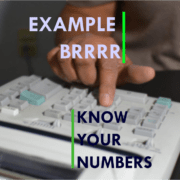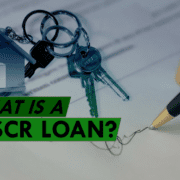Don’t let a declining market get you down. Now is the best time for real estate investing!
Money is tightening. Inflation is up. Houses are staying on the market longer. So, why is this still the best time to invest in real estate?
This declining market will be one of the greatest opportunities to create generational wealth… as long as you’re ready for it.
Even as a beginner real estate investor, now is a great time to get prepared to make your first real estate investments.
Here’s where you can start.
Real Estate Investing In a Declining Market
You keep hearing that the fed is raising rates, inflation is hitting, and money is tightening. But what does this really mean for real estate investors?
Availability In a Declining Market
As inflation goes up, there’s less money for everyone. Including real estate investors.
This might feel like whiplash from the last ten years. Until recently, there was plenty of money for everyone in the real estate world. Rates were lower, loan-to-values on loans were higher, and money flowed fairly freely.
But now funds are tightening up. This will mean two main things for investors:
- Lenders will require more money down
- They will have higher credit score range expectations for borrowers.
Now is the perfect time to prioritize your credit score. Improving your credit score by thirty percent will put you in a fantastic position moving into this next market.
Purchase Opportunities in a Declining Market
Rates are going up, money’s tightening… but inventory is growing. Soon, the cost of homes will drop.
You want to buy right at that moment, as money is shifting down but properties are shifting up. Sooner or later, the market will shift back.
When money gets easy again and prices go up, you increase your cash flow and net worth because you bought in the declining market.
Inflationary times are not a negative for investors. As long as you’re prepared, now is the best time to invest in real estate. If you can get money, you’ll be one of the few people out there looking for deals. Five to ten years from now, you’ll be reaping the benefits in big ways.
Loans for Real Estate Investing with Tightening Money Policy
Tightening money policy is what we call it when central banks raise the federal funds rate.
When this occurs, what’s happening to the money? And what loans can you still get for real estate investing with tightening money policy?
Changes to Expect for Loans with Tightening Money Policy
If the pool of investors and borrowers for banks is a box, then tightening policy shrinks that box. Not as many people can get in. Lenders are more particular about who they’ll lend to and how much they’ll give.
There are a few main ways this will impact loans for real estate investing.
Credit Score & LTV
The two biggest changes are that lenders will offer a lower loan-to-value and require a higher credit score.
LTVs have lowered from 80% down to 75% on average. For example, let’s say you found a BRRRR property for $100,000. In the recent past, you could get an $80,000 loan fairly easily. Now, you’re more likely to get only $75,000.
At the same time, credit score requirements are going up. Many lenders are increasing their accepted credit score range by 20 to 40 points. If a 700 score could get you a good loan last year, you might need 720 or 740 for that same loan today.
What does this mean for you? With tightening money policy, here’s what you need to be prepared:
- Higher down payments
- A better credit score
- Lower debt to income ratio
- If possible, more investment experience.
Real Estate Investment Loans Moving Forward
In the short term, as LTVs go down, you’ll need to put more money into deals. As rates get higher, cash flow goes down.
But in the long term, buying now with housing prices low means higher profit once prices rise again.
Investors who can qualify for real estate loans now will have a huge advantage when the market shifts again.
Talk to other investors. Find out which lenders are still active in your area. Though banks have less money to go around, investors who can get themselves in a good position with credit, income, or a funding partner will be able to take advantage of the market.
Remember: now is the best time to create generational wealth through real estate investing.
How To Get a Loan For Real Estate Investing in 2022
You’ll want to take advantage of this best time to invest in real estate. But with money tightening in the second half of 2022, how do you get a loan for real estate investing?
Where’d the Money Go?
Over the past several years, a lot of money was flooding the market from hedge funds. Now, a third of those hedge funds have backed off. Banks interest rates are being tightened by the fed to have more reserves. Hedge funds and banks want to figure out where the market is going before putting more funds back in.
So, who is still lending during this time? Some banks, especially investor-friendly local banks, will still have some loans available. Other options, like private money also have more restrictions than usual but can still be a good option during this time.
New Real Estate Investing Lender Relationships in 2022
Things are changing in the real estate investing world. As an investor, you need to be more proactive.
It was easy before – lenders would market to you to get their loans. But over the last few months, rates are skyrocketing, LTVs are plummeting, down payments have increased from 0-10% to 15-20%… and loans are fewer and further between.
It’s as if investors have had control over lenders – able to tell them what they want to do and when they need the money. Not so much now. Lenders have less money to put out, so they need to be pickier. For success, make yourself an investor they pick.
The Best Time to Build Your Team of Real Estate Investment Lenders
The best way to get a loan for real estate investing in 2022 is to build up an array of lending options. Spend time creating a larger pool of available funds. Now (before fund availability totally plummets) is the best time to create partnerships and positive relationships with the real estate lenders in your area.
Our prediction is by the first quarter of 2023, the really good deals will start to become available. Get prepared now with good relationships with small banks, local private money lenders, and OPM lenders.
Real Estate Investing Tips in This Market
Although this is the best time to invest in real estate, the typical investment strategies – fix-and-flips and BRRRR rentals – might be harder than usual in the upcoming market.
Our real estate investing tips for this market are to look into subject tos and owner carries.
Investing Tip: Subject Tos
Subject tos are coming back into fashion for real estate investors.
Some people recently got fix-and-flips, expecting prices to stay up and buyers to keep bidding. But soon, this easy market will come to an end, and sellers will have a harder time getting houses sold. Owners in this situation may be open to setting up a subject to.
A subject to is when you take over someone’s mortgage on a property. The owner can’t make payments, they can’t sell with a dropped market, and they don’t want to go into foreclosure. So you can take over the property and the mortgage – without the loan going into your name.
So instead of struggling to get a loan in this market, you can pay the loan that’s already on the property. You get better rates, and you can get a property with little to no money down.
Investing Tip: Owner Carries
Owner carries are a bit less common than subject tos because an owner carry requires no existing mortgage on the house.
In an owner carry, the seller needs to own the property free and clear (the most common example is when a home is willed after a family member dies).
A client we worked with had a seller in this position. The seller was going to put the money from the sale in a bank account to gain interest on it. The buyer requested an owner carry instead, where she essentially made mortgage payments to the seller.
The seller got a 5-6% return instead of the 1-2% they’d have gotten at the bank. And the buyer got the house without the struggle and high rates taking out a bank mortgage.
Now is the best time to invest in subject tos and owner carries. Everyone is looking for a better rate, and some people will be needing an exit strategy with their properties in this upcoming down market.
Invest in Real Estate with No Money Down in 2022
In the down market from twelve years ago, we helped several families buy ten properties at great values with no money down. Now, one of those people owns eight of those properties free and clear. Both the values and the cash flow on those properties have quadrupled.
2022 will be another chance to swipe up some properties at a lower cost for zero down, if done right.
Set Up Money to Buy – Cash, HELOC, or OPM
When property values go down, interest rates go up. When it flips back, property values will go up, interest rates will come down, and you can refinance.
Refinancing when the market picks back up increases your cash flow. It also increases the value of your asset and will enable you to take out more money later.
But before this market dip, you have to be prepared.
Put aside any cash you have. Get a HELOC now, if you have an existing mortgage. Set up partnerships with people you know who have money.
People near retirement are hit with inflation just as much as you. They’ll get a higher return by lending securely to you. Having the power of other people’s money will give you the freedom to purchase properties during this time of opportunity.
Now is the best time to prep to invest in real estate… before property values go down.
Now Is the Best Time To Invest in Real Estate
This down market will likely be around for a couple years. It can be the best time for real estate investing – even for beginners.
Start your prep now, keep an eye out for active lenders, and be ready when the market brings great opportunities.
If you can adapt with the markets and adapt to the new flow of money during these tight times, you’ll be able to have a successful, wealth-generating real estate investment career.
If you’re just starting out, or if the money side of investing is not your thing, let us help you!
Reach out at HardMoneyMike.com.
Happy Investing.










